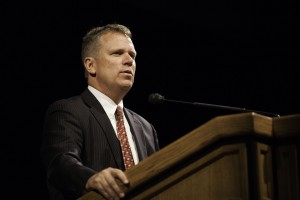
A BYU dance professor taught about the importance of raising a personal ebenezer and remembering spiritual experiences at Tuesday’s Devotional.
Curt Holman, associate professor and associate chair in the BYU Department of Dance, began his address by explaining the term “ebenezer,” found in the hymn, “Come Thou Fount.” He explained that it is a reference a story in 1 Samuel, when Samuel sets up a stone as a monument to the help God have given Samuel and his people.
“In Hebrew, the word Eben-ezer means ‘stone of help,'” Holman explained. “This Eben-ezer, quite literally was a monument set to remember the great help God granted the one raising the stone.”
Holman then suggested that people ought to create their own monuments to remember the blessings of God in their lives. These monuments should be built of remembered and treasured spiritual experiences.
“Each experience that we have with the Spirit can be like placing a stone in our own personal monument reminding us of God’s hand in our lives,” he said.
Holman illustrated the importance of building these monuments of memory by recounting a story from his mission in Chile. He explained that one evening, while teaching a family, he had a profound spiritual experience and felt a testimony of what he was teaching more powerfully than he ever had in his life. Afterward, he felt an added urgency to get home and write in his journal, where he recorded every detail he could remember. He even concluded his journal entry with the plea to himself to re-read what he wrote if he ever found himself questioning his faith.
Holman said that this experience was a major stone in his monument and remembering that experience throughout his life had strengthened his testimony.
For those who think their personal monuments are small or even eroding, Holman offered two steps to help build their monuments stronger.
Holman’s first suggestion was that people look to the past.
He explained that by reflecting on the past, people can gain a greater spiritual perspective and can more clearly see spiritual promptings in experiences that may have seemed insignificant at the time.
“At some point you have felt the presence of God. Maybe it was a small prompting to make a particular decision or a simple witness that you felt when someone bore testimony,” Holman said. “By recognizing these experiences, you are building your own monument.”
He added that if people don’t reflect upon these moments, they risk forgetting that they ever happened.
Holman’s second suggestion was for people to actively seek opportunities or environments where they can feel the Spirit.
“If my testimony is based on one singular spiritual experience that I had 30 years ago on my mission, then my testimony is at risk and my monument is in danger of eroding,” Holman said.
As Holman finished his address, he echoed King Benjamin’s warning in the Book of Mormon about the importance for people to remember their faith and testimonies.
“The final words, ‘Remember and perish not,’ underscore the plea of prophets both modern and old that if we do not want to perish, we must remember,” Holman said. “On a personal level, this means that our memories of God’s hands in our lives are not only monuments to God, but they are testaments that he loves us and is aware of each one of us and our personal needs.”




